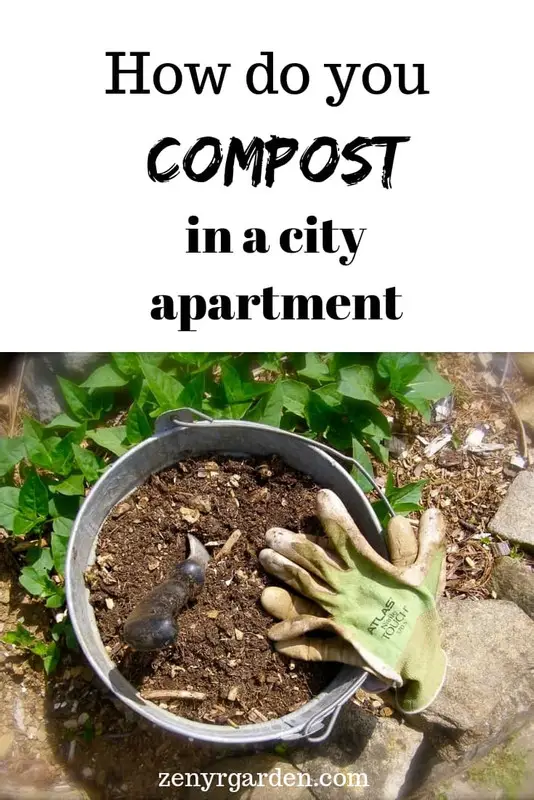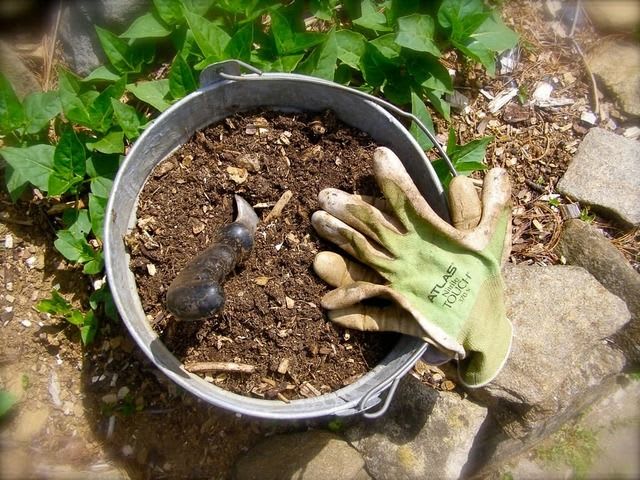When composting in a city apartment, the number one thing people worry about is the smell & the flies and sometimes the mess. There are some good ways of composting to keep the smell bearable & keep the pests away. Let's see some ideas together.
What to Put in the Compost
If you want to keep the smell down, then avoid putting stuff like meat, milk, cheese, fish, seafood or high-protein/high-nitrogen foods in your compost. While decomposing, these materials tend to give off quite an unpleasant smell. It's much more unpleasant than the smell of fruits or veggies while decomposing.
A Good Ratio of Browns & Greens
A good recommended ratio of the browns & greens for a compost is 3:1. So that is 3 parts browns to 1 part green.
The browns are stuff like cardboard, brown leaves, wood clippings, etc. These contain lots of carbon and give the structure & body for your compost. It also creates good channels for air circulation.
The greens are the young tender stuff like green leaves, veggies, fruits. These contain lots more nitrogen & are the foods for the decomposing bugs to feed on. They tend to rot much faster than the browns & give out more water in the compost.
A 3:1 ratio is a good balance to give your bin good air flow, moisture & heat for decomposing.
There's a little rhyme to remember this (shared by a YouTube viewer):
Too much green smells like a latrine. Too much brown slows it down.
From this ratio, in a box we can mix for example:
3 parts brown:
- egg carton
- Amazon boxes
- toilet paper core
1 part green:
- banana peels
But what about the meat, diary or cheese that we don't usually put in because of the smell?
What to Do With the Meat, Diary Food Waste?
In a traditional hot compost, people usually don't put in meat, cheese or cooked foods, bones, onions, citrus because of the smell & the high acidity content. Because while those are decomposing, they tend to give off a very unpleasant smell.
But what can we do with those food waste then? If you're living in an apartment & have some of these hardcore stuff in your trash can, you could try bokashi composting.
With bokashi composting, you'll get some really good benefits and results:
#1. Faster Compost Done
The basic idea of bokashi is fermenting. It's cold composting the food waste with the help of some incredibly useful microbes. The compost can be done much faster in about 2-4 weeks. You can then use that compost as fertilizer or soil in the garden. The juice can be collected and used as a liquid fertilizer.
#2. No Nutrient Value Loss
As there is little heat or gas generated, the initial nutrients of the food waste will not be transformed by heat. And thus will be retained more fully.
The best thing of all is that with bokashi there is little or no bad smell at all.
If you'd like to get a quick-start overview with this bokashi thing, here are some baby steps to help you get started:
Quick-start Guide: Bokashi Composting
Step 1: Collect the Good Microbes
- Wash 1 cup rice with 2 cup water
/wash-the-rice.jpg)
- Put rice wash 1/4 in jar with breathable cloth cover
/rice-wash-in-a-jar.jpg)
- Put jar in warm dark place for 2-7 days
/put-rice-wash-warm-dark-place.jpg)
- When the liquid smells a bit sweet-n-sour, it's ready to use
/rice-wash-done.jpg)
Extract rice wash out in bottle to use or for spraying:
/rice-wash-in-bottle.jpg)
What we're doing here is gathering the good bacteria on the rice grains, or more specifically the Lactic Acid Bacteria (LAB).
Noticeable by their sour smell, these are the good microbe guys existing in our yogurt or sourdough yeast. They will do the work for us to ferment (break down) the food scraps in the next step.
Step 2: Doing the Composting
- Put food scraps in a container & spray the liquid generously
/put-food-scraps-in-container-spray.jpg)
- Close the lid tightly and let it do its thing
/ferment-bokashi-bucket.jpg)
Here we use a 6 liter ice cream tub. The lid is airtight, easy to open (to put in more food waste) and the whole bucket is lightweight.
Every day if you have food scraps, you can dump them into the container.
Step 3: Compost Done & Getting the Juice
Every 2-3 days, you can open the lid and extract the bokashi juice.
It does not smell bad at all. Smells quite sweet with a bit of milky hint. We guess it's because of the 'lacto' guys.
/getting-bokashi-juice.jpg)
This juice can be mixed with water at a 1:100 or 1: 200 ratio to spray and fertilize plants.
/lacto-in-bokashi-juice.jpg)
And when most of the contents of the bucket has turned darkened or unrecognizable from the food from the beginning, your compost is done. You can now use this as soil to grow your plants.
A next little thing to note:
Where to Put the Compost Bin
From many folks experience, it is almost always better to keep the compost bin near the food waste source. For example, putting it somewhere in your kitchen where food waste may be produced every day. Or somewhere around the balcony. The idea is to make this an easy task so we don't have to think too much about doing it and it doesn't feel like yet another chore.
When you're done cutting some fruits/veggies, you can throw the peels right in the bin next to you. Or when you have collected quite an amount of waste in a day, you can take it out & dump it in the bin on the balcony. This is simply so the distance is close near by. We then don't have to walk too much too far or carry anything too heavy up & down stairs. This helps make composting fun & less labor intensive for everyone.
Tips on What to Do When Things Go Wrong
Even if the compost goes bad sometimes, here are some ideas to quickly deal with the problem:
How to Keep the Smell Down
If it starts to smell putrid, then check if there is:
- Too much moisture
- Too little oxygen
- Too much nitrogen
The ways to fix this are:
#1. Sourdough to the Rescue
To deal with the smell fast, you can mix some sourdough starter with warm water. Spray this mixture around the compost. It will get rid of the odor & the compost will smell much nicer. If you can't find sourdough starter, bread yeast or beer yeast also works. It's the little microbes in these things that help ingest the smell.
#2. Control the Moisture
If you find there's too much moisture in the compost, then add in some more browns. Throw in some more cardboard or shredded paper to help soak up the water. If you have brown packaging paper, crumble it up before putting in. This helps create some air pockets for oxygen.
If you're thermal composting (aka hot composting), the lack of oxygen may also be an effect of too much moisture. The excess water traps the oxygen down. It helps if you turn the compost once a week or every other week. If we put in too much greens, it can smell very bad. The nitrogen, or the protein, is one main cause for this.
You can also see:
How to Keep the Flies Away From Your Compost
If you don't like flies buzzing around your area, one practical way is to keep the lid of the compost box on. Also, try aerating the compost a bit more. If there's a good supply of oxygen, the compost will not smell too bad.
Without a putrid smell, flies like houseflies won't be attracted to come. The foul smell signals to the flies that there is food for her babies. She'll then be attracted to come & lay eggs there.
You can try taping around the lid to avoid any gaps. Flies love laying eggs in small, dark gaps. If we also use some microbial spray, the pheromone will help keep the flies or flying insects away. The sourdough yeast + water mixture also works great for this purpose.
Also, check out this one little thing:
Apartment Composting: Less-Smell Less-Mess
As you can see, composting in a city apartment is a doable thing & does not need to be extremely labor-intensive.
If you know how to keep the smell down & how to keep the flies away, then you're off to a good start to having great, nutrient-rich soil for your plants. Also, check out bokashi composting. It's something that you may like & find useful.
Hope this brief post has given you some ideas to get started & have lots of fun composting. See you all next time!
For more bokashi composting uses, you could check out:
Share or pin this post!


